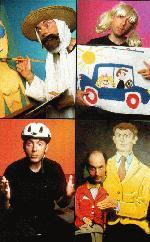SEARCH CurtainUp
REVIEWS
FEATURES
NEWS
Etcetera and
Short Term Listings
LISTINGS
Broadway
Off-Broadway
BOOKS and CDs
OTHER PLACES
Berkshires
London
LA/San Diego
DC
Philadelphia
Elsewhere
QUOTES
On TKTS
LETTERS TO EDITOR
FILM
LINKS
MISCELANEOUS
Free Updates
Masthead
Writing for CurtainUp NYC Weather
Where Did Vincent Van Gogh?
By Les Gutman

Dan Castellaneta
|
The actor falls out of character -- because "a nervous breakdown has no structure, no arc" -- only to be commandeered by an alien who's searching for nine humans to save from the impending doom that is earth. It's nothing more than a pretext for Castallaneta to show off his many talents, of course, but the rewards are so great, we couldn't possibly worry about the premise.
Castellaneta, best known as the voice of Homer Simpson and as a cast member on "The Tracey Ullman Show," cut his theatrical teeth with a four year stint at Chicago's famous Second City. He's a very clever writer and a master of seemingly innumerable voices, but what registers most here is the fluidity with which he shifts from character to character. How he continually surprises us with his transformations is little short of magical.
Most memorable are the show's most fully developed bits -- ones in which Castellaneta portrays a ventriloquist's dummy, a girl named Flopsy telling a story with her own hysterical water-color paintings and a musical theater type (with a day job at the New York Public Library) pitching a new show: a love story about cats and dogs, and their owners, complete with songs and dance. You can't help but be impressed by the way he uses a 1X4 plank of wood to represent everything from a piano to a baseball bat, by the seamless morphing of his face or, for that matter, the exceptional way Chad McArver's lighting design is employed in this service. It's always difficult in shows like this to draw the line between the writer-performer and the director, but the fact that original director Art Wolff (also a Tracey Ullman alum) retains a credit certainly suggests the extent of his contribution to the flawless staging if not the comic timing as well.
Toward the end, the actor escapes the alien mantle, and Castellaneta uses the opportunity to speak directly to the audience. He's intent, it seems, on giving the piece some higher meaning -- a brief, didactic existential riff that we would be better off without. Shove it and all other such intrusions that come to mind aside. This one's pure pleasure. Go forth and have fun. Also, be advised: it's an intimate (i.e., small) space and a short run.
| WHERE DID VINCENT VAN GOGH?
Written and performed by Dan Castellaneta Directed by Brian Feehan (Original Direction by Art Wolff) Set Painting: Paul Burke Lighting Design: Chad McArver Music by Laura Hill and Mr. Castellaneta Lyrics by Mr. Castellaneta Running time: 1 hour, 15 minutes with no intermission A production of Riverside Stage Company Website: www.riversidestageco.com Chelsea Playhouse, 125 West 22nd Street (6/7 Avs.) (212) 279 - 4200 Opens 9/20/2000 limited run Reviewed by Les Gutman 9/21 based on 9/19 performance |


